NEW CLASS ROLLS IN
Tulane welcomes most diverse incoming class in history
ELLIE COWEN NEWS EDITORThis fall, Tulane University boasts — yet again — its most diverse incoming class. The class of 2027 hails from 49 states and territories, 36 countries and 41% of students identify as a person of color, up 38% from last year.
The admissions cycle also reflects shifting values from the administration, as fewer students were accepted
Five news items you missed this summer
BY LINDSAY RUHL | PAGE 4early decision to increase accessibility to lower-income applicants. This change raised the acceptance rate from 8.5% for the class of 2026 to 13% for 2027. Tulane still ranks among the colleges with the lowest acceptance rate nationally.
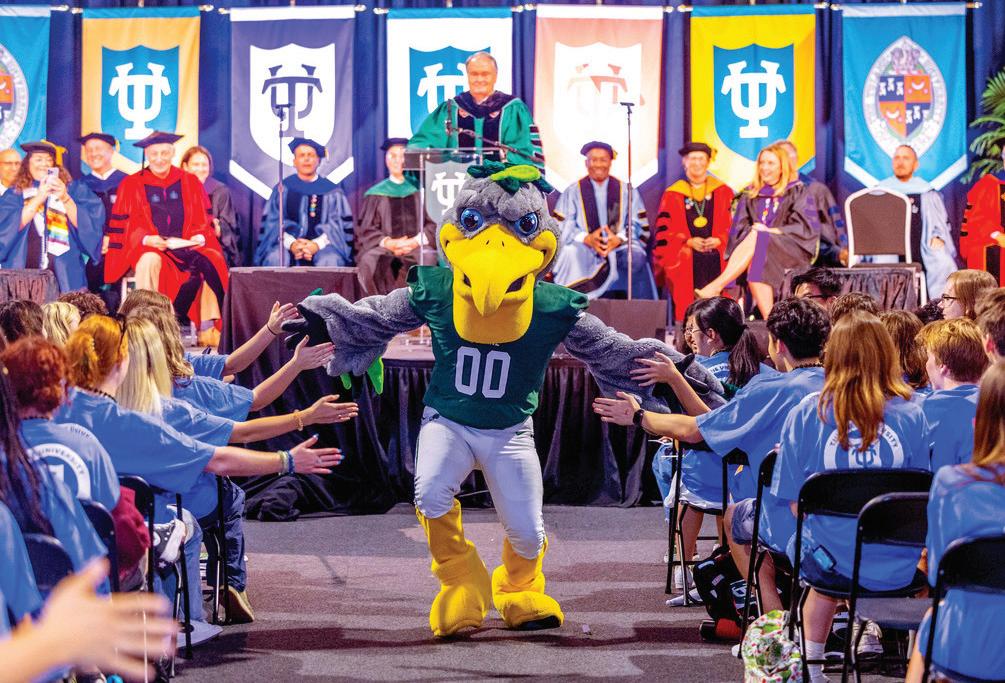
“It became clear that we need to save more room in the first-year class for students who are not ready to commit
What’s brewing: Popular Uptown coffee shops
BY MAX HANDLER | PAGE 6— especially financially — to a university so early in their high school career,” Shawn Abbott, vice president for enrollment management and dean of admissions, said. “While our financial aid offers are extremely competitive for all rounds of admission, it can still be intimidating for families to make such a firm commitment to a university with-
Letter to the Editor:
Beginning better in our 119th year
BY GABI LIEBELER | PAGE 8out seeing other offers of admission and financial aid during the Early Decision admission process.”
Abbott has previously emphasized the importance of improving socioeconomic diversity through scholarship al-
CONTINUED ON PAGE 3
Game calendar: What’s in store for Tulane Football this fall
BY BENNY GREENSPAN | PAGES 14-15New Tulane AI policy to prioritize academic integrity, innovation
RAYNAH JACOBS CONTRIBUTING WRITERTulane University will not ban the use of ChatGPT — and other similar machine learning and deep learning technologies — on its campus. In fact, Tulane encourages both its students and faculty to engage with and explore the uses of AI programming. The university has established new infrastructure to ensure that researchers carry out their work with AI in the most efficient and ethical ways possible.
In an email to students and faculty, President Mike Fitts said that the university’s goal is to “harness the exciting promise AI holds to advance our institutional mission and the lives of the members of the Tulane community.”
ChatGPT’s release has raised concerns about academic integrity. The software can generate homework and test responses, and this form of cheating cannot be detected by the software that is traditionally used to identify plagiarism. AI technology also poses problems regarding reliability and inclusivity, including fears for how it will impact intellectual property rights.
Any form of AI assistance on homework, quizzes and tests that goes beyond the scope of grammar and spell checking is not in compliance with Tulane’s Code of Academic Conduct. It is also prohibited by the university’s academic integrity policies, according to a letter to professors
from Provost Robin Forman.
This summer, Tulane created the Connolly Alexander Institute for Data Science and the Center for Community-Engaged Artificial Intelligence to design AI systems that are fair, transparent and accountable. The Data Hub was renamed after a $12 million donation from Tulane alumni Libby and Robert Alexander to support data literacy.
The Data Hub first launched in 2021 and began its first course, Introduction to Data, this semester. The center also provides grants to undergraduate students in fields of data science.
Tulane’s third center focused on AI and data research is the Jurist Center for Artificial Intelligence. The center, which intends to ensure research and education in AI and related fields, supports a healthier and more connected global communi-
ty, according to an article in Tulanian Magazine.
However, it remains unclear how the university plans to negate the potential risks that an openarmed embrace of machine learning and deep learning AI on campus could pose to academic honesty and integrity of students.
A recent survey found that nearly one in three college students nationwide have used ChatGPT on written assignments in the last year. Recently, ChatGPT technology succeeded in passing graduate-level tests at several universities.
There is not yet a reliable system to detect when a student has used generative AI programs to complete their work. GPTZero is the most accurate detection software available, but studies show that it can still produce false positives.

In his letter, Forman said professors are encouraged to explore these AI programs for themselves so they can identify the technology’s deficiencies and use those to design coursework in such a way that makes it easier to identify when students use AI software on their assignments.
Forman also said faculty should consider allowing students to experiment with generative AI programs, both to invite innovation and also to prepare them to one day work in a job that could be changed by AI.
English professor Matthew P. Smith said he has done experimentation with ChatGPT and found that the software does not do well with making value statements. He plans to create writing assignments that encourage students to take a stance and make judgments, as well as use in-person exams.
“I think oral examinations are one way to figure out how much (students) know of the material,” Smith said. “The downside is that those might be a little intimidating, but I’m hoping it will be more like a conversation where I can get a sense of if the student is learning or not.”
“ChatGPT presents an opportunity to help students understand how artificial intelligence systems work, how to question easy answers, identify bias, examine dubious claims, apply logic, and form critical arguments,” Fitts wrote in an opinion article for USA Today in April.
Hurricane season: preparing for “above normal” projections
PATRICK JOHNSON STAFF WRITEROnAug. 11, the National Oceanic and Atmospheric Administration forecasters boosted their projections of this hurricane season to “above normal” levels of hurricane activity.
Hurricane season for the southeastern United States is a period of increased Atlantic Ocean cyclone formation between June 1 and Nov. 30. This year, the NOAA estimates a 70% likelihood of 14 to 21 named storms hitting. Of those, six to 11 will likely become hurricanes and two to five major hurricanes.

Idalia, the first hurricane formation impacting the gulf this season, slammed Florida’s west coast and moved north towards Georgia and the Carolinas on Aug. 30.
Tulane University’s Office of Emergency Preparedness and Response reminded students of its evacuation policy to keep students and staff safe in the event of a weather-related emergency.
“The Office of Emergency Preparedness and Response has developed a com-
prehensive policy for weather events, including hurricanes, that may require evacuation [...]. All students are expected to activate their evacuation plans when the university encourages the activation of personal evacuation plans.”
The office will update students on potentially impactful hurricanes and monitor their paths ahead of time.
“Based on its long experience and expertise, [we] prepare for all hurricane seasons in a thorough manner regardless of what the forecast is regarding how active or inactive the season may be,” Executive Director of Emergency Management Jason
Ferguson said. “If a storm is forecasted to impact our community, we will provide information about the storm’s path, the status of university operations, and resources to help you stay safe through the storm.”
In the meantime, the office heavily encourages students, faculty and staff to complete a self-evacuation action plan. Evacuation plans are personalized and in-
dependent; students can execute them at their discretion.
“By having a personal evacuation plan, students should feel empowered to implement that plan when a storm is approaching, regardless if the university
shelters in place or evacuates,” Ferguson said.
Students must notify professors if they wish to leave campus before the closure announcement.
Ferguson said he encourages students to take at least one week’s worth of supplies when evacuating as well as materials to attend class remotely. This includes government issued IDs, Splash Cards, medications, valuable items and service animals.
In the event of an evacuation, Tulane will run shuttles to Louis Armstrong New Orleans International Airport for students flying to another city and assist in student evacuation.
“Students should watch local news for weather updates as well as monitor official Tulane channels, including email and social media (@TulaneU and @TulaneEmergency on Instagram) for hurricane updates,” Ferguson said.
Tulane admission policy adjusted to SCOTUS affirmative action ruling
The Supreme Court reversed its position on affirmative action on June 29, ruling that the affirmative action policies of Harvard College and University of North Carolina were unconstitutional under the Equal Protection Clause of the 14th amendment. Tulane University has assembled a group of experts to inform its policy going forward, according to President Mike Fitts.
The Supreme Court based its decision on the fact that the schools’ affirmative action policies disadvantaged certain students and lacked “meaningful end points,” according to a report from the Congressional Research Service.
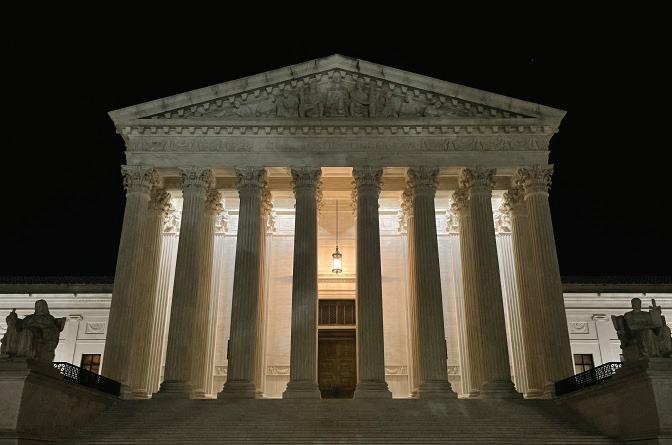
According to the majority’s opinion, college admission programs may still consider an applicant’s race in the discussion of their personal experiences with discrimination or otherwise, but cannot use race itself as a deciding factor.
“The student must be treated based on [their] experiences as an individual — not on the basis of race,” according to the majority opinion.
Tulane’s admissions process included affirmative action programs for both higher education and employment. Fitts circulated a statement to the Tulane community when the decision was
announced, but the university has not explicitly detailed ways the admissions process will change following the new regulations.
Tulane will “continue to welcome and support students, faculty and staff from the widest range of cultural and educational backgrounds,” Fitts said in the email. “Experts from across the university [have] been meeting regularly and that their efforts will inform our practices to ensure we continue to attract the best and brightest students.”
“Tulane’s admission criteria and processes are tailored accordingly to comply with the law,” Director of Diversity Initiatives, Valencia Jones, said.. “We practice a holistic, individualistic, and contextual review to evaluate multiple, intersecting factors-academic, non-academic.”
Tulane welcomes most diverse incoming class in history
lotment. In this effort, Tulane’s Office of Admission has continued to shift money away from merit to need-based scholarships, though both scholarships will continue to be offered indefinitely, according to Abbott.
“Affordability shouldn’t be a barrier to having access to a Tulane education,” Director for Diversity Initiatives, Valencia Jones, said. “We will continue to increase recruitment engagement, establish partnerships with community-based organizations, and refine financial aid procedures to increase transparency and reduce barriers for students from modest income backgrounds.”
This year, 9% of incoming students are Federal Pell Grant recipients from low-income backgrounds and 10% are first-generation college students, an increase from 7% last year.
In terms of academics, the class of 2027 should have no problem adjusting to Tulane’s academic rigor, with an average ACT score of almost 33 and an average unweighted GPA of 3.7. Submitting ACT or SAT scores remained optional for the class of 2027 and the majority of students did not submit scores.
The new students on campus will not remedy the gender imbalance, as 64% of incoming students’ legal sex is female. On campus, 61% of all current students identify as female. The class of 2027 also welcomes the highest number of LGBTQ+ students to campus in history, at 13%.
“This is simply a reality that mirrors a national trend where women are applying and enrolling in larger numbers at most highly selective colleges and universities,” Abbott said. “We have a much larger female-identifying applicant pool so it’s not surprising that more of them are represented in this year’s class.”
Second only to Louisiana with 230 committed students, the Northeast is the next most represented region, followed by the South Atlantic and the Pacific West.
“All of these numbers represent new admissions records for us and reflect our commitment to attracting a diverse community of outstanding scholars,” President Michael Fitts said in a campuswide email. “The opportunity to live, learn and engage with others whose experiences differ from our own is a cornerstone of higher education, leading to innovation, improved decision-making, and civil discourse.”
Lake, River popular among students; more dorms planned
SUNDEE WIN CONTRIBUTING WRITERThissemester, nearly 700 of Tulane University’s sophomores moved into the newest dorms on campus: Lake and River Halls. Completed after a long-awaited construction process, the residence halls have received positive reviews from their residents and visitors alike.
The residence halls, which replaced Phelps and Irby, house students in both single and double suite-style rooms. They are part of the first phase of The Village, which includes a raised courtyard, a 200-seat theater and the Small Family Collaboration Hub, a common space.
According to Tim Lempfert, executive director of housing and residence life, the new dorms improved Tulane’s housing program by bringing more students on campus, as well as developing new projects for community building and living-learning opportunities.
Lempfert said there are two dining spaces expected to open later this year, one facing McAlister Drive and one across from the back door of the Hub.
Construction is also set to begin soon on two new buildings where Irby and Patterson were formerly located, both of which will be residential halls.
“Creating a space in the residence halls that supports not only personal and social development, but creating an environment that’s conducive for academic success is incredibly important,”
Lempfert said. “Another important goal was to create spaces where students and faculty could interact, organically, helping establish new relationships beyond the classroom.”
Sophomore Charlotte Sherrod said her new living space in River was an upgrade from her freshman year dorm.
“It’s so much cleaner and brighter, and just the facilities are so much nicer,” Sherrod said. “I don’t have to really worry about getting sick from mold [and] I love having a new bathroom attached to my suitemates because it’s really fun to be with more people.”
Lake and River are connected by a wide outdoor terrace on the second floor.
“It’s fun because you can just walk back and forth between [the two
dorms],” sophomore Emelia Cooperberg said. “With your friends all living in the same area, I think there is a big sense of community. It makes plans and hanging out a lot easier.”
The Hub in between the two dorms has become a fan favorite, due to its combination of study spaces and gaming options. Students are often found either crowding over the gaming tables or working in booths or tables.
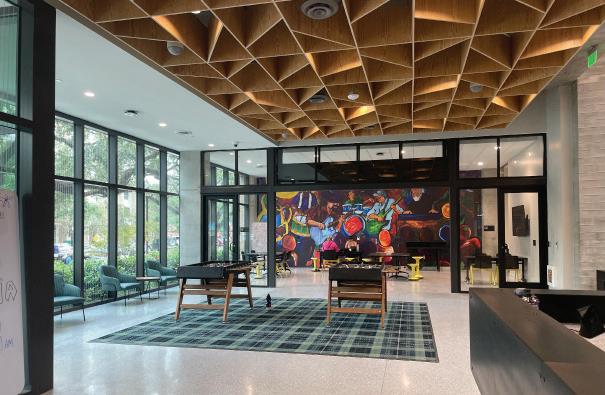
“The Hub is really fun. I learned how to play pool and foosball,” Cooperberg said. “There’s lots of study spots, which is very nice, because I know the business school gets filled out so quickly.”
The new living-learning spaces have attracted students living all over campus. First-year student Austin Levin just visited the Hub for the second time.
“I play shuffleboard, and now pool,” Levin said. “The shuffleboard tables are really nice and remind me of home.”
Looking outside of his new window
in the Housing and Residence Life Office of River Hall, Lempfert said he can spot students coming and going from the Hub at all times of the day.
“It has been really exciting to see,” Lempfert said. “It’s starting to play out the way we’d hoped it would play out.”
“I’m really proud of the work that the team has done to put together what I think is a great space for students to live,” Lempfert said.
Drought, heat, wildfires plague state
This summer, New Orleans and Louisiana faced record-breaking temperatures, along with several wildfires in southwestern Louisiana. So far, there have been 13 three-digit temperature days.
WWL-TV Chief Meteorologist Chris Franklin stated in a news release that the chances of seeing even one 100-degree day in Louisiana are less than 1%. Sunday Aug. 27, was the hottest day ever in the state of Louisiana, with a temperature of 105. Louisiana is not the only place experiencing raging heat waves; July was the hottest month on record for the entire planet.
Additionally, the Louisiana Department of Agriculture and Forestry released that 441 fires have burnt at least 8,385 acres from Aug. 1 to Aug. 24. Louisiana Governor John Bel Edwards has been active on social media, spreading awareness about the dangers of the wildfires.
The Tulane hullabaloo
Five news items you missed this summer
State passes ban on transgender youth healthcare
In June, lawmakers in Louisiana passed a ban on transgender minors’ access to transition care, further legislation that would put a ban on puberty blockers, hormone treatments and surgeries for minors. The ban would also create a punishment for any healthcare professional who attempted to provide that care.
Democratic Governor John Bel Edwards vetoed the bill, but with the legislature’s Republican majority, the bill passed by a large margin to override the veto.
In a veto letter on June 29, Edwards said “It is unfathomable to think that in my last few months serving as governor of this state that I would sign into law a bill that categorically denies health care for children and families based on propaganda and misinformation generated by national interest groups.”
Louisiana polls show support for capital punishment
According to a new poll, Louisianians opposed Governor John Bel Edwards’ plan to spare the lives of prisoners on death row.
The last time Louisiana had an execution was in 2010, despite the fact that 57 people are on death row. The poll was administered by The Advocate | The Times-Picayune, The Urban League of Louisiana, WWL-TV of New Orleans, The Public Affairs Research Council of Louisiana, KATC-TV of Lafayette, WBRZ-TV of Baton Rouge and KTBSTV of Shreveport.
The polls found that 51% of voters disagree with Edward’s goal to lessen the number of people on death row, and instead commute their sentences to life without parole.
New dining options offered on campus
Tulane now offers dining options from Pei Wei and Wildflower Kitchen located in the LBC, which have replaced Star Ginger and Rollin’ n Bowlin’.
Wildflower Kitchen serves health foods such as bowls, smoothies and toasts. Pei
Wei offers authentic Asian and Chinese food.
There is also a new food truck called the Pizza Hub, which is stationed outside of The Small Family Collaboration Hub that offers late night dining and accepts meal swipes. Additionally, starting on Sept. 5, the Commons will no longer accept Loyola’s meal swipes, and will only accept Wolf-Bucks. For Loyola students, breakfast will now be $16, lunch $18 and dinner $20.
New pool opens in Reily
The Reily Center unveiled its newly renovated indoor swimming pool on Aug. 25.
The Olympic-sized pool has gone under major renovations over the past year, adding new features such as new diving stands, new starting blocks, all new lighting and a new filtration and sanitation system for better water quality. A new outdoor social pool has also opened, which will be available to all students.
COVID-19 cases reported at Tulane, mirroring statewide increases
COVID-19 cases at Tulane University rose during return to campus in August, mirroring statewide increases of illness that returned this summer — more than three years since the pandemic began.
In an email from Campus Health sent to students on Friday, Tulane said there has been “an increase in COVID-19 cases nationwide, including in the Tulane community.”
The school is “treating COVID-19 as something more akin to other respiratory illnesses such as the flu,” the email said. “We are, however, monitoring the situation and will make any changes to our policy if recommended by public health officials.”
Life at Tulane has mostly returned to normal, almost four years into the COVID-19 pandemic. This semester, the school has not required any of the early pandemic protocols, like masking or social distancing. Tulane announced this summer it strongly recommends but no longer requires vaccines and boosters. But this fall, some students said they tested positive as early as the first day of class via at-home tests.
English professor Erin Kappeler asked her students to wear masks on Aug. 29. After the first two class meetings, she said three students out of the seven had notified her that they had tested positive for COVID-19, and two others notified her that they were ill with symptoms that could have been COVID-19.
“I teach two classes back to back in the same room, meaning all of my students, none of whom wore masks for the first two class meetings, were directly exposed to COVID-19,” Kappeler said. “I asked students to wear masks for our next meeting to try to slow the spread. We know that COVID-19 is on campus and we know that masks help to slow the spread of COVID-19, so this seems a logical and reasonable request. A couple of students refused, but most did not seem bothered by the request.”
Dr. Patricia Kissinger — professor, infectious disease epidemiologist and associate dean of faculty affairs and development — said most people have antibodies, either from a vaccine or previous infection.
“There’s less urgency than there was,” Kissinger said.
Tulane spokesperson Mike Strecker said most students who have reported positive tests to the university this fall are “experiencing mild flu-like symptoms.”
“The case numbers for Tulane and Orleans parish as a whole are nothing compared to the level we saw at the height of the pandemic,” Strecker said in a statement.
It is nearly impossible to tell how many students have tested positive for COVID-19 at Tulane. Tulane does not require students to notify the university if they test positive and has discontinued the database of cases it kept updated throughout the early pandemic.
But cases are rising across the country.
Louisiana recorded over 8,000 new cases last week, according to the state
Department of Health. Those numbers jumped significantly from early summer lows. In June, numbers showed as few as 128 new cases per week throughout the state. But by Aug. 13, Louisiana recorded 738 new cases a week. Hospitalizations remain low throughout the state.
Cases are also rising across the regions home to many New Orleans college students. In Mississippi, COVID-19 hospitalizations rose 21% last week and more than 1,400 people reported illness with symptoms similar to the COVID-19. In California — home to many Tulane students — hospitalizations in August rose by nearly 32% in two weeks.
The strains likely circulating are the latest versions of the omicron variant and may also include a new subvariant called EG.5.
The Centers for Disease Control and Prevention does not expect new variants to lead to dramatic surges, especially among the vaccinated. Current vaccines still have some protection from the strains, and a new fall booster is expected to target the newest strains more effectively.
Still, some schools across New Orleans have taken note.
Dillard University in New Orleans announced last week it would require students and employees to wear masks indoors in response to the rising cases across Louisiana and the South. The mandate is likely temporary and the university told students masking would be required while it watches case trends.
Kissinger called that choice “heavy handed.”
“The majority of the population has some kind of antibodies,” Kissinger said. “The majority of the Tulane community is younger and healthier, so it won’t be as much of a concern.
“They can continue to do what they’re doing and we don’t need to go on lockdown,” Kissinger said. “We definitely don’t need to do hybrid.”
At Loyola University, Vice President of Student Affairs Alicia Bourque warned students in an email last week that cases are rising at the Uptown campus, which is just steps from Tulane. She urged basic hygiene practices like handwashing and covering coughs, the Loyola Maroon reported, but made no mention of masks.
Kappeler said she was aware of COVID-19 spreading fast on campus, so she felt asking students to wear masks would help stop the spread.
“It seems logical to me to mask to protect ourselves and especially members of our community who are immunocompromised or who may end up dealing with major complications,” Kappeler said. “I know we all want things to go back to normal, but unfortunately viruses don’t care what we want.”
Kissinger feels Tulane handled the pandemic effectively.
“Tulane did a great job,” Kissinger said, by testing students and tracking cases during the early pandemic. “So I think we’ve got a good roadmap if another pandemic like this comes.”
Governor, religion, election integrity on ballot this season
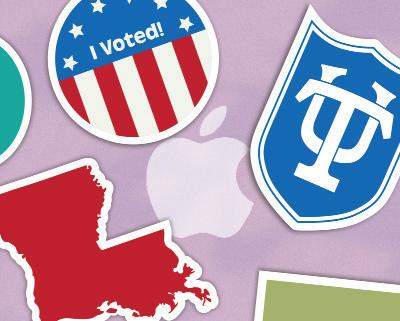 ELLIE COWEN NEWS EDITOR
ELLIE COWEN NEWS EDITOR
The seat for Louisiana governor is up for grabs this fall as incumbent Democrat Governor John Bel Edwards is term limited. The primary election will take place on Oct. 14 and if no candidate receives more than 50% of the vote, the final election will be Nov. 18.
Frontrunners in the race are Republicans Jeff Landry and John Schroder, Democrat Shawn Wilson and Independent Hunter Lundy. Landry is at a significant advantage in campaign contributions with over $9 million raised so far.
All university students are eligible to vote in Louisiana elections, though only students with Louisiana IDs or driver’s licenses can register through the online platform. Out-of-state students must complete a paper application using their social security number and proof of residence.
TurboVote is an online platform that simplifies the registration process and will mail students, with a return envelope, the application with most of the information prefilled. The program also allows students to check their registra-
tion status and will send reminders for upcoming elections.
Landry is the current Louisiana state attorney general and is the only candidate endorsed by the Republican party and former President Donald Trump. With experience working in law enforcement, his campaign has centered on cracking down on crime.
The Louisiana Democratic Party is endorsing Wilson, the former secretary of the Louisiana Department of Transportation and Development. A graduate of University of Louisiana, Wilson supports increasing teacher pay and improving the statewide literacy rate. He also supports expanding medicaid and handling the surge of fentanyl use as a public health crisis through public education campaigns and aid distribution to local communities, according to his campaign website.
Republican Schroder is the current state treasurer and formerly served in the LA House of Representatives. Schroder’s platform focuses on crime and corruption, as well as improving education and strengthening the economy by removing barriers to small business development. According to his campaign website, he aims to prevent a
deficit in the state budget while still reducing personal income taxes.
Lundy is running as an independent. He is a member of the governing board of the National Association of Christian Lawmakers, a nonprofit group that advocates for faith-based legislation. He is pro-life, except when a mother’s life is threatened and supports the death penalty, according to a profile from nola. com.
There are eight measures up for public vote this election season, four each on the October and November ballots.
Amendment 1 would “prohibit funds, goods, or services donated by foreign governments or nongovernmental sources” from being used by state and local governments in running elections. Supporters of the measure claim it will strengthen election integrity, while critics say it will further exacerbate shortages for election funding.
Amendment 2, also called the “Constitutional Right to Worship in a Church or Place of Worship Amendment,” would create a provision in the state constitution describing the right to worship as a right worthy of the “highest order of protection.” This would allow courts more scrutiny over any laws passed that conflict with the right to worship.
Mollye Demosthenidy named new NTC dean
JULIA GOLDMAN STAFF WRITERAftera national search and consideration of candidates across the country, Tulane University appointed Mollye Demosthenidy as the new dean of Newcomb-Tulane College this summer. Through her experience working at Tulane and in the city of New Orleans, Demosthenidy said she is prepared and thrilled to serve as a leader in this new role.
“I am looking forward to working with all our schools to expand opportunities for interdisciplinary study, both inside and outside the classroom,” Demosthenidy said in an email. “That might be cross-school programs, new certificates or experience pathways centered around big issues. There are so many possibilities, and that makes this role really exciting.”
Demosthenidy is a Louisiana native, born in Alexandria, Virginia and received her Bachelor of Science from Louisiana State University and Juris Doctorate along with a Master of Health Administration from Tulane in 2007. Before her faculty work at Tulane, she practiced law at two New Orleans firms with a focus in healthcare litigation.
Demosthenidy said her work in different programs at Tulane each prepared her for the role of NTC dean. She served as a professor in the Department of
COURTESY OF JENNIFER ZDON
Health Policy and Management in the School of Public Health and Tropical Medicine. She said her real-world experience and academic interests translated into her class curriculums.
With her membership in the NTC academic integrity committee and role as a faculty principal for the College Scholars Program, along with a Residential Faculty Mentor in Butler Hall, Demosthenidy said she is already involved in the programs she is going to lead.
When reflecting on her past roles and experiences, Demosthenidy said that she
has navigated her career shifts with an open mind and took advantage of each opportunity to grow both professionally and personally.
Demosthenidy said, “Engaging with students has always been my favorite part of the job,” and while she already misses her time in the classroom, “When the opportunity to consider the role of Dean presented itself, I pursued it!”
Since working at Tulane, Dean Demosthenidy has received numerous awards in teaching. She has been honored with the Mortar Board Teaching Award from
the Newcomb Institute, the Dean E. Elaine Boston Award for Outstanding Long-Term Commitment to Students and twice with the Student Government Association Teaching Excellence Award. She is also a five-time recipient of the Outstanding Undergraduate Public Health Teaching Award, as well as a member of the Delta Omega Honor Society.
In this role, Demosthenidy said she wants to help build meaningful connections between students and faculty, which is something she said Newcomb-Tulane has a strong history of providing.
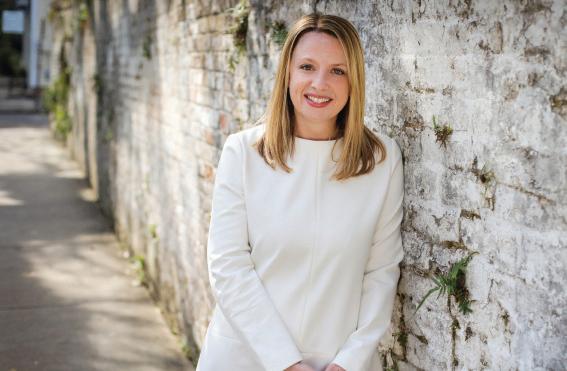
“My goal is that we cultivate opportunities for students and then support them as they navigate their own academic journey,” Demosthenidy said.
Demosthenidy said she is a proud Tulanian, with an undeniable spirit for the university and its students. She is raising her family close to campus and met her husband in the Tulane Bookstore in law school, and they have not left New Orleans since.
“Ultimately, we want students to be a force for good in their communities and beyond!” Demosthenidy said in the email. “New Orleans is such a special place, so I encourage students to explore as much as possible while they’re here.”
What’s brewing: Popular Uptown coffee shops
MAX HANDLER ARCADE EDITORNew Orleans’ status as a major port city makes it a cradle for commerce in the Gulf of Mexico. Coffee beans are one of the many goods imported into the city by ship. In fact, the Port of New Orleans is considered “the number one coffee port in the country,” according to the Louisiana Department of Culture, Recreation and Tourism. It should come as no surprise that the city, especially around Tulane University’s campus, is home to some spectacular coffee shops.
Tulane’s fall semester is already underway, and many students may be in search of a new location to complete schoolwork or fraternize with peers. Coffee shops, with their comforting blend of caffeine and coziness, are conducive to such an atmosphere.
Rue De La Course, housed in an antiqued bank building, is located on the corner of Oak Street and South Carrollton Avenue. This airy cafe features two
floors of seating, which ensures customers will always have a place to sit. The first floor is usually louder than the second floor, owing mostly to the open environment and high ceilings. However, once one ascends the stairs to the second floor balcony overlooking the entrance, the noise levels diminish almost immediately. It is here where one can zero in on their assignments in peace. Rue De La Course offers a wide variety of beverages to the public. Some highlights include their Caffe Latte and their Yerba Mate Latte. The coffee shop also sells locally sourced pastries and desserts to those with a sweet tooth.
Z’otz Cafe is one of the more eclectic coffee shops in the New Orleans area. This quaint cafe is also settled on Oak Street, surrounded by other popular eateries and drinkeries. The quirks of Z’otz
can be spotted on entry, as the walls of the establishment are adorned with dozens of eccentric decor pieces. All of the artwork featured is visually impressive and truly speaks to the invitingness of the cafe. Every employee at Z’otz is a natural conversationalist who is typically more than happy to explain one of the new menu items offered. In the back of the shop lies a secluded room, ideal for those seeking intimate conversation or the peace to work. Z’otz boasts locally roasted coffee and delicious muffins among numerous drink and pastry offerings. Their menu is perfect for any time of the day, especially late at night, as the coffee shop is open until 11 p.m. all week.
The Rook Cafe can be found a mile from campus on Freret Street, conveniently located across from a comfort food favorite, Bearcat Cafe. Much like

Z’otz, the walls of The Rook Cafe are covered with art pieces from local artists. Not a single surface lies untouched. The tables and chairs are a charming mix of weathered wood and leather. Comfortable seating arrangements can be found at the front window, allowing customers to people-watch while enjoying one of The Rook’s signature concoctions. If quiet is desired, one can simply make their way to the back of the shop where lamp-lighted tables offer the utmost peace for studying. Their robust food and drink menu includes chess-inspired names such as the “Queen” and the “Pawn,” as well as odes to pop culture with the “Millenium Falcon” and the “Holy Grail.” The coffee shop also allows customers to play one of their many tabletop games on hand. Of course, chess is offered. New Orleans’s rich coffee history lives on through these three cafes, as well as countless others throughout the city. By simply patronizing one of these establishments, you do your part to keep the coffee legacy flowing.
City beat: What’s up in New Orleans
Festivals
Southern Decadence can trace its roots back to a humble going away party in 1972. Now, 51 years later, it has morphed into New Orleans’s largest LGBTQ+ festival. This year’s iteration of the six-day event kicks off this Thursday, Aug. 31. Decadence’s website bills the festival as a “non-stop party,” with most of the action centered in the many French Quarter bars and clubs. Visitors should make an effort to catch the Southern Decadence’s main parade on Sept. 3, the final day of the festival. Fortunately for revelers, the parade and most other events are free. Expect this year’s Southern Decadence to be yet another amazing celebration of queer culture.
Sports
The Tulane University Green Wave football team is preparing to kick off its 2023 campaign. This Saturday, Sept. 2, the squad starts week one of the college football season with the highest expectations they’ve ever seen in over two decades. This unprecedented buzz is thanks to the team’s improbable season the year prior, which culminated in a Cotton Bowl win and a 12-2 record. In the wake of their Cinderella season, the Green Wave lost important parts of its winning team, including running back Tyjae Spears and linebacker Dorian Williams, to this year’s NFL draft. Despite the personnel losses, hopes remain high in New Orleans, mainly due to the return of quarterback Michael Pratt and offensive lineman Sincere Haynesworth. Saturday’s contest against regional foes University of South Alabama will provide a glimpse into what the future holds in store for the newly vaunted team.
Music
The New Orleans Jazz Museum is welcoming accomplished jazz drummer Gerald French to the institution’s weekly “New Orleans Music Fridays” event. On Sept. 8, the New Orleans native will take center stage at the museum’s performance center for the second time this year. French’s storied career includes performances at the New Orleans Jazz & Heritage Festival and the French Quarter Festival. French currently plays with The Original Tuxedo Brass Band and The Dixie Cups. Nicknamed “The Giant” due to his unique style of drumming, the percussion virtuoso’s performance should be on every jazz enthusiast’s radar.
Markets
City Park is the jewel of the Lakeview District. Its natural beauty, enhanced by live oaks and other native plants, is rivaled by few. The green space is no stranger to fun events such as farmers markets, music performances and family-friendly workshops. On Sept. 9, the nonprofit organization Arts New Orleans will stage their monthly art market on the Goldring/ Woldenberg Great Lawn. Over 30 regional artists will be showcased, with mediums that range from paintings to ceramics. Patrons will have a wealth of choices to pick from for purchase.
Literature
Walter Isaacson has one of the most prolific resumes of all time. Throughout his decorated career, the New Orleans native has served as the CEO of CNN, editor of Time Magazine and president of the Aspen Institute. Now, he is a history professor at Tulane.
Always a skilled writer, Isaacson has written numerous bestselling biographies. This year, his newest work hits shelves on Sept. 12. Its person of interest is Elon Musk, one of the most divisive figures in the world right now. Some herald the tycoon as a tech genius,
while others disapprove of his penchant for conspiracy theories and bigoted statements. The book “Elon Musk” should be a fascinating dive into the psyche of a complicated man.
Galleries
New Orleans museums have seen an increase in visibility this summer. The widely publicized “Museum Month” granted select museum members free admission to participating institutions in the month of August.
A popular exhibit in the New Orleans Museum of Art was one of the main draws for patrons. Fashioning America: Grit to Glamour showcases American clothing through the lens of cultural shifts across the country. Spanning centuries, this stunning presentation features over a hundred pieces of fashion essential to the fabric of American society. The exhibit is open at the NOMA until Nov. 26.

REVIEWING “WORLD MUSIC RADIO”:
Is Jon Batiste pop music’s new god?
IAN FAUL ARCADE EDITORAfter his quintuple Grammy Awards win last year — a feat that involved beating chart toppers like Billie Eilish, Olivia Rodrigo and Taylor Swift for the Album of the Year — Jon Batiste was essentially given a green light. His acceleration was rapid; he went from Stephen Colbert’s grinning bandleader to an artist at the upper levels of the pop stratosphere and a household name almost instantly.
This August, Batiste released his newest project, “World Music Radio,” an ambitious concept album with a gumbo of global stars, sounds and symbolisms. Featured on the album are such diverse artists as the K-pop group NewJeans, New Orleans-born rapper Lil Wayne, saxophonist Kenny G and the familiar favorite Lana Del Rey.
Batiste has often been hailed as an undefinable, genre-bending artist backed by considerable musical chops — he comes from a lineage of musicians and is a graduate of the prestigious jazz programs of the New Orleans Center for the Creative Arts and The Juilliard School — but “World Music Radio” places him squarely in the world of pop. Auto-tuned falsetto vocals are present on many tracks, along with programmed drums and big synths. This instrumentation diverges sharply from the realistic, acoustic instrumentation of his previous album, “We Are.”
In a recent PBS interview, Batiste made his goal in creating the album explicit: to dissolve the “horrendous” concept of world music by creating a more inclusive pop music and to compete with artists like Taylor Swift. In other words, he wants to take over pop music and then change it from the inside.
The album achieves pop apotheosis with the song “Be Who You Are.” Its music video was produced through a brand deal with Coke Studio, and the corporate sponsorship comes through in the video’s dizzying and de trop animation. The song itself is similarly effervescent and over-sweet, full of morsels of pop wisdom — in three languages, no less.

Then, Batiste side-steps and drops
a song like “Butterfly,” a tender piano ballad located in the middle of the album. In “MOVEMENT 18’ (Heroes),” he defies the atemporal sterility of much of pop music by honor-
takes on a lofty, philosophical air in speaking about it. In an interview with The New York Times, he said that “by listening to it and experiencing it, you have a realization about the
made a small god. In this incarnation, he is Billy Bob Bo Bob, a cosmic DJ searching the universe for “the vibe.” His alter-ego narrates the album in airy tones, sometimes descending into the tracks to drop an approving remark. Like Billy Bob, Batiste wants to be nowhere and everywhere, alien and approachable. But this comes at a loss: in his trying to do everything, he sacrifices some of his personal and artistic authenticity.
The same goes for the indiscriminate humanism of the album. Batiste sings on “Be Who You Are,” “love Black folks and white folks, my Asians, my Africans, my Afro-Eurasian, Republican or Democrat.” The message of radical, universal love is generally praiseworthy, but here it feels like just another way for Batiste to hold the world in his hands. What is actually radical and admirable is his attempting any political commentary in such a commercial album.
While the intended response was a unifying and “hyper-conscious” experience, I instead feel manipulated, as if I’m just one of the necessary subjects in his plan to reach global stardom and then change pop music. Given a five-Grammy win, anyone would take the ball and run as far as he could with it. In his haste, however, he seems to have grown disoriented. Like his alter-ego yet again, Batiste is still searching for the vibe.
ing his musical idols, which include Wayne Shorter, Quincy Jones, Duke Ellington and Alvin Batiste. “Master Power” has country contours, with steel guitar and a train beat on the drums.
In contrast to the music’s accessibility to a range of audiences, Batiste
self, about community, about humanism, that leaves you in a state of bliss and a hyper-consciousness.”
I’m not sure what that means, but I don’t think I experienced it.
What is actually clear is that Batiste is aiming for a kind of world domination. Of his role as bandleader he has
Because of how fully his ego penetrates the album, I have a hard time separating the art from the artist, but there are some undeniable hits. “Raindance” and “Uneasy” have catchy hooks and infectious, danceable beats. “Worship,” my favorite track, is the closest Batiste came to making me realize a collective humanity; there is something about the combination of swelling house synths, Latin-inspired groove and mantra-like lyrics that will move you.
In the Batistian spirit of embracing all idioms — English and Korean, high-brow and colloquial, classical and pop — I say of the album: There were some bangers but honestly it was mid.

Tulane should eliminate traditional grading systems
CARLY BAROVICK VIEWS EDITORIt is common to hear professors make jabs at their students for “only” caring about their grades. As a result, students are taught to be cautious when speaking to professors about grades in an effort to offset their preconceived — but completely accurate — notions that they care solely about their transcripts. Students are coached to disguise legitimate concern for evaluations that will either expand or limit future opportunities as a passion for learning and a commitment to improvement.
In Tulane University’s trademark course, Taylor Your Life, students discuss Carol Dweck’s research on fixed versus growth mindsets. The fixed mindset assumes that an individual’s abilities are inherent and static, and that success is a confirmation of these abilities. A growth mindset, on the other hand, assumes that one can improve their abilities through effort.
“Although people may differ in every which way — in their initial talents and aptitudes, interests, or temperaments — everyone can change and grow through application and experience,” Dweck explains.
In a study conducted by Dweck, children were given two different types of praise after completing questions from an IQ test. Children were either praised for getting a good score — an ability praise — or for the effort they put into solving the problem — an effort praise.
“The ability praise pushed students right into the fixed mindset, and they showed all the signs of it, too: When we gave them a choice, they rejected a challenging new task that they could learn from. They didn’t want to do anything that could expose their flaws and call into question their talent,” Dweck said. However, 90% of the effort praised students “wanted the challenging new task that they could learn from.”
Dweck’s study deduced that those with a growth mindset — which was cultivated in this instance by effort praise — were more likely to want to learn new things and take on new challenges, while those who were ability praised were more likely to shy away from challenges. Her research concluded that those with a growth mindset were more likely to be successful.
Similar research has affirmed these conclusions and proved that when individuals have to complete work that is graded, they choose less challenging material, perform
less optimally, derive less pleasure from their work and express more feelings of anxiety. Moreover, grades have been proven to not serve as an accurate reflection of a student’s learning or an adequate tool for providing constructive feedback.
So the question follows, why does a school that promotes cultivating a growth mindset in a course they proudly advertise structurally function in a way that inhibits students from cultivating this mindset for themselves?
And even further, if extensive research that has been available for decades clearly demonstrates the negative impacts of grading on students, why do educational institutions continue to do it?
The folly of grading systems can especially be seen through the grading methodology found within the A.B. Freeman School of Business.
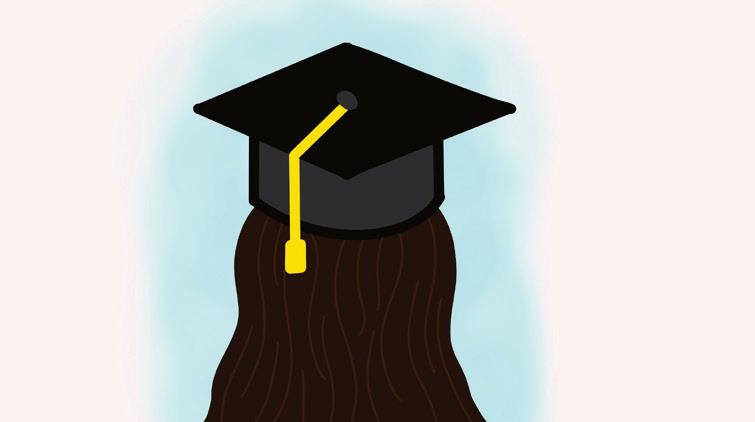
According to its website, core Bachelor of Science in management courses are expected to have a maximum class GPA between 2.700 and 3.000, while elective BSM courses are expected to have a maximum class GPA between 3.000 and 3.333. In other words, Freeman relies on a curved grading system, which in its essence means that some students must fail in order for others to succeed, even if the work of fail-
ing students is satisfactory. Not only is curved grading categorically cruel, but it creates an overly competitive learning environment that is antithetical to the university’s purported core value of collaborative engagement.
A major shift is necessary in education policies and standards across the board. Numerous books offer alternatives and address how institutions can shift their practices, such as “Making Sense of College Grades: Why the Grading System Does Not Work and What Can be Done About It” or “Off the Mark: How Grades, Ratings, and Rankings Undermine Learning (but Don’t Have To).”
Tulane must put in the work that always comes with branching away from convention in order to prioritize the well-being of its students and meet the standards that its mission statement expresses.
Alfie Kohn articulates these ideas thoroughly in his essay “The Case Against Grades” where he writes, “‘Like it or not, grading is here to stay’ is a statement no responsible educator would ever offer as an excuse for inaction. What matters is whether a given practice is in the best interest of students. If it isn’t, then our obligation is to work for its elimination and, in the meantime, do what we can to mini-
From college to career: The vital role of internships
MIMI MUIR CONTRIBUTING WRITERWhenconsidering how to spend the summer, many Tulane University students chose to complete an internship for the invaluable experiences and advantages they offer. Internships provide hands-on training, networking opportunities, skill development and critical insights into future careers. Through real-world training in their desired industry, students gain clarity on career paths and build connections for job prospects down the road. Many roles are paid — helping students to offset college expenses — while others offer academic credit towards degree requirements.
Some companies use their internship program as a recruiting tool to identify talent for potential full-time job offers, particularly in finance, where many pursue a rigorous full-time summer internship in the hopes of receiving a coveted return offer.
Rising senior, Kate Cook, interned with Bank of America this summer as a Wealth Management Summer Analyst in Philadelphia in the Private Bank Summer Analyst Program. Cook plans to pursue a finance position after graduation and is majoring in finance with a minor in marketing and real estate.
Cook completed rotations on invest-
ment, trust and relationship management. She worked on her trust project and a final investment project that consisted of mock client interviews and opening a portfolio investment account. Cook’s courses in strategic management and organizational communication helped her day-to-day task completion and communication with clients. Bank of America also organized networking events throughout Philadelphia including MLB games, which Cook enjoyed attending with her coworkers.
Davis Norton served as the Strategic Operations intern at Krispy Kreme, a Fortune 500 company in Charlotte, North Carolina. Norton is a senior with double majors in legal studies and business management. Norton’s favorite course at Tulane has been Corporate and Cooperative Strategy, which Norton said provided him with career clarity.
Norton found the Krispy Kreme job posting on LinkedIn and messaged the company’s Human Resources representative. His tasks included project storage optimization, waste management and inventory analysis. Norton came up with an equation to help reduce waste and measure the sale systems against inventory usage, which increased productivity. The company asked Norton to keep working into the fall and he will work remotely for 10 to 15 hours throughout the semester. Norton also received an Microsoft Excel certification at his internship that he can
apply to his course and studies at Tulane this fall.
Sophomore Lauren Turner interned with Todd Strategy Group in Washington D.C. as a Government Affairs & Health Policy Intern. Turner drafted summaries of Congressional hearings, health policy forums, webinars and other policy events. She also conducted policy research on drug pricing, Medicare 340B and Medicaid. In her role, Turner responded to adhoc policy inquiries from biopharmaceutical life-science and health manufacturing clients. Turner hopes to attend law school after graduation and continue working in health policy.
Senior Katie Merk, studying ecology and evolutionary biology, with a minor in psychology, worked as an orthopedic medical assistant in Chicago, and her responsibilities included administrative duties including greeting patients and managing patient records, taking medical histories and updating patient files. Merk plans to pursue graduate school and participate in additional clinical programs.
Senior Kwesil Ezeh interned for Liberty Mutual this summer and was in their Ironshore brand in environmental claims. Ezeh said she learned about the “world of insurance and how the insurance industry works and how vital insurance is in our everyday lives.” Ezeh is a political science and international relations major, and she said that the “internship really solidified
wanting to go to law school and specializing in insurance law.”
College courses can provide strong foundations to support students to develop skills that are valuable during internships. When selecting a major and relevant coursework, students can evaluate opportunities to translate skills to a professional setting and enhance possible future opportunities. Tulane students are working to advance their careers and get direct on-the-job experiences. Using Tulane’s alumni network and resources like Linkedin, as well as Tulane Career Services, can serve as an excellent foundation. Tulane also offers career-oriented courses including Taylor Your Life and programs such as Tulane Remote Industry Program that connects students to alumni and Tulane parents in a variety of industries to advance understanding and learning. In a competitive job market, practical experience can serve as a key asset for students launching their careers.
NEWS BRIEFS
Fondling, burglary reported Uptown last weekend, police say
Content Warning: The following article contains mention of sexual violence.
Tulane University Police Department responded to a burglary and sexual battery incident Aug. 26 at an off-campus residence, a TUPD safety notice said.
The victim — a student who lives in the 900 block of Pine Street — reported an unknown male entered the residence at about 3:30 a.m. and “unzipped
the victim’s pants and touched them in their private area,” TUPD said.
Police said the victim described the subject as a “male with short black hair wearing a white shirt and dark pants.”
Anyone with information is asked to contact TUPD.
LINDSAY RUHL | BREAKING NEWS EDITORFood pantry opens on Zimple Street
A student-run food pantry opened Sunday on Zimple Street and aims to serve Tulane University students and staff.
The pantry — located in The Chapel of the Holy Spirit — will offer fruits, vegetables and non-perishables. Any Tulane student or staff member can use the pantry by ordering food through a
QR code and selecting a pick-up time.
The pantry is led by members of Students Against Food Insecurity. The group has over 100 volunteers and works to fight food insecurity, which studies show impact students and staff at colleges and universities nationwide.
MARTHASANCHEZ | MANAGING EDITOR
Neutral Ground Coffee to open in Carrollton
New Orleans’ oldest coffeehouse will soon have a new location near Tulane University.
Neutral Ground Coffee expects to open at the corner of Oak Street and Adams Street in one year, the Uptown Messenger reported.
The popular coffeehouse lost an old lease on Danneel Street in April but now plans to renovate and lease a vacant
building on the corner. The building is managed by the owner of nearby Snake and Jake’s Christmas Club Lounge, according to the Uptown Messenger.
Neutral Ground Coffee is currently seeking city approval to open in the residential area. The coffeehouse has served New Orleans since 1976.
MARTHA SANCHEZ | MANAGING EDITOR
Tulane starts space law program
There are no lawyers in space.
But there could be, after Tulane University launched a new space law program this summer.
Governing space is a challenge: there are no precedents, no case studies and, mostly, no people. But Tulane’s new program is betting on a growing industry and offering two space law courses this fall: “Space Law: Jurisdiction and
International Treaties” and “Space Law: Property, Tort, and the Environment.”
Classes will study maritime and aviation law to understand the new and rapidly changing field of space, and students could also discuss international treaties, national security, environmental challenges — and even space debris.
MARTHA SANCHEZ | MANAGING EDITOR
Tulane Undergraduate Assembly begins year with elections
Tulane Undergraduate Assembly elections for first-year candidates ended Friday and a lottery selection process is underway for six additional delegate seats that may be filled by students from any class.
TUA has not formally announced the first-year winners, but 16 freshmen competed for seven first-year delegate spots.
Elections for sophomores, juniors and seniors occur in the spring.
TUA meets every other Tuesday of the school year from 7 p.m. to 9 p.m. in the Lavin-Bernick Center for University Life. Meetings are open to all students.
Tulane sailing headquarters gets multi-million dollar donation
Two donors gave $2.75 million to Tulane University Athletics this summer to build a new sailing headquarters on Lake Pontchartrain where the Green Wave Sailing team trains.
Community Sailing New Orleans, a nonprofit, has long hosted Tulane’s sailing team at the lakefront. Donors, including Libby and Robert Alexander, also helped buy boats and equip-
ment for the original facility.
The new facility will be two stories and 4,500 square feet.
Libby Alexander is a Tulane graduate and was a member of the club sailing team at Tulane.
MARTHA SANCHEZ | MANAGING EDITORNOLA parklets allowed to remain, for now
New Orleans bars and restaurants with “parklets” — the popular pandemic-era form of outdoor dining — can keep the structures in place temporarily after the New Orleans City Council paused a plan that originally required businesses to remove street dining by Aug. 31.
The parklets still in New Orleans can now exist for six more months while the
city council debates permanent regulations. The council’s plan does not allow restaurants to open new parklets during that time period.
The council’s enforcement pause came after it originally gave all businesses a deadline of Aug. 31 to take down the parklets.
MARTHA SANCHEZ | MANAGING EDITORStatewide burn ban continues in Louisiana
A burn ban continued in Louisiana this week after dry conditions led to dozens of wildfires that continue to burn across the state this month.
The state first issued the ban Aug. 7. It means no one in the state of Louisiana can burn private land for agriculture purposes. Residents also cannot burn trash or yard waste. The state threatens criminal or civil penalties for anyone
found in violation of the ban.
The Louisiana Department of Transportation also warned drivers that cigarettes thrown from vehicles can cause fast-spreading fires.
About 600 wildfires have burned across Louisiana in August, The Advocate reported.
MARTHA SANCHEZ | MANAGING EDITORJacksonville shooter kills three in racist attack
On Saturday a 21-year-old, white gunman killed three Black people in what Jacksonville, Florida police consider to be a racially motivated attack.
The shooter — Ryan Christopher Palmeter — left several manifestos behind detailing a “disgusting ideology of hate,” according to Sheriff T.K. Waters.
After killing Angela Michelle Carr, 52, Anolt Joseph “AJ” Laguerre Jr., 19 and Jerrald De’Shaun Gallion, 29, Palmeter turned his swastika-painted gun
on himself.
In 2017, Palmeter was held under the Baker Act, a Florida law that states “a person may be taken to a receiving facility for involuntary examination” if they are deemed harmful to themselves or others.
Local law enforcement confirmed Palmeter legally obtained the two firearms used.
UNC physics professor fatally shot Monday
A week into the school year, University of North Carolina, Chapel Hill is mourning the loss of Zijie Yan, associate physics professor and researcher, who was shot and killed on Monday.
Yan studied at Rensselaer Polytechnic Institute and co-published 17 papers with his former advisor, Doug Chrisey, Tulane physics professor and Jung Chair of Materials Engineering.
Charged with first-degree murder, UNC graduate student Tailei Qi entered Caudill Labs at approximately 1 p.m. EST and fatally shot his faculty advisor. UNC police have yet to identify a motive.
Back-to-School Shopping
BY JARED GOUDSMITDOWN
1. Halloween décor
2. Song for a diva
3. Rapper Azalea
4. Choreographer Bob
5. Beat it
6. iPod Mini successor
7. “___ be a pleasure!”
8. Authority, slangily
9. Pancake topping
10. Texter’s “!!!!”
11. Cooking class
12. Hashish pipe
13. Newspaper supplement
18. 59-Down exterior
22. Ancient Yucatán resident
25. Side view
26. Catches some rays
27. Dance fad of the 2010s
28. Longoria of film
29. Christmas tree
31. Tic-tac-toe win

34. “Breaking Bad,” e.g.
36. Falls apart
38. On the nose
39. Hosp. scan
40. “Slippery” tree
41. Thanksgiving dish
42. Mud bath locale
46. Christie who wrote “Death on the Nile”
47. Fresh start for a film franchise
ACROSS
1. Street urchin
5. Peeved states
10. “Didn’t see ya there!”
14. Thus
15. Comedian Griffin
16. Apollo 11 destination
17. *Lavish sort
27. Hip-hop’s Mos ___
30. Deck out
32. Millionaire’s vessel
33. Fervent
35. Scooby-___
36. Exxon product 37. *Metaphor for fun
43. Give the boot
44. Wrath
45. High-five sound
46. Enticing scent
49. Euphoria
51. Cage fighting sport: Abbr.
52. *”Wake up, dummy!”
54. Upend
56. “Honest” prez
57. Young Egyptian king
58. Finely-ground deli meat
62. Snitched
48. Verdi opera based on a Shakespeare play
49. Gift in “Coraline”
50. Window ledge
53. Hungers (for)
55. Hunt illegally
58. Pizzazz
59. Greek wrap
60. Beat writer ___
Cassady
61. General assembly?
63. Beaver’s creation
65. “I’ll take that as ___”
Tulane needs new diversity measures post affirmative action
Beginning better in our 119th year
GABI LIEBELER EDITOR-IN-CHIEF SETAH ALAVI STAFF WRITERTulane University released a statement June 29 regarding the recent U.S. Supreme Court decision on affirmative action. In the statement, Tulane acknowledges the importance of diversity as a tenant of excellence and the necessity of inclusivity in the community.
Affirmative action refers to the policies aimed at increasing the number of minority students on college campuses — populations that are historically excluded from these institutions. The Supreme Court’s ruling changed the precedent that previously allowed universities to use race-conscious admissions policies. The Supreme Court decision systematically dismantles equity by forcing students to tell their stories without the context provided by race and minority status.
If Tulane wants to stand by its commitment to diversity and inclusion, it must look to alternative programs. The Supreme Court ruling focuses on admissions, but schools have already implemented recruitment programs and scholarship opportunities aimed to increase diversity on campuses.
The University of Michigan and the University of California have already begun looking for alternative ways around the outlawing of race-conscious admissions. Both of these schools funneled millions into programs similar to Tulane’s Office of Equity, Diversity and Inclusion, but those programs have fallen short, leaving minority students to wonder about their spot at top academic institutions nationwide.
Tulane has a well-established EDI office with the mission to increase diversity on campus. The office coordinates activities, initiatives and resources to help minority students attend and thrive at Tulane. Their website highlights “A Plan for Now” and “A Strategy for Tomorrow,” two initiatives to guide the university towards becoming a more inclusive community. The EDI office is a great resource for students, but it is unknown if the pre-existing programs will offset the loss of affirmative action in Tulane’s admission process.
In Tulane’s June 29 statement, the school ensured its commitment to diversity but failed to mention plans and upgrades to the EDI office. At Tulane, where 70% of the student body is white and only 8% are considered low-income, it is imperative that Tulane continues to seek innovative ways to improve diversity.
The most effective way for Tulane to increase diversity in admissions is ending legacy preferences, a practice that gives admission preference to the direct family members of alumni. Historically, minority populations have been
ex - cluded from higher education institutions. In the modern day, this scheme creates a feedback loop in which descendants of white alumni receive preferential consideration compared to their minority counterparts.
Studies show that the admissions rate for legacy applicants in many highly selective institutions is three times higher than that of non-legacy applicants. In 2014, Johns Hopkins University eliminated legacy preference and saw a subsequent 10% increase in first-generation students and a 7% increase in Federal Pell-eligible students. At Tulane, legacy admission is still alive, and legacy applicants are encouraged to disclose their connections to Tulane’s Office of Advancement.
In addition to removing barriers for minority students, there are active ways to create a student body that is more reflective of the population. Lawmakers in California, Texas and Florida have already started innovative methods to increase diversity in admissions. All three states implemented percentage plans, in which the top percentage of every high school’s graduating class receives automatic admission into local public institutions of higher education. These plans increase diversity by taking students from all high schools around the state, thereby making the student body more representative of the overall state population.
The recent Supreme Court case has undoubtedly changed the future of college admissions for the foreseeable future. Structural barriers prevent many minority students from receiving the same resources as their white counterparts. Affirmative action in college admissions was a step towards true equity in the U.S. Now, the future looks uncertain for many students.
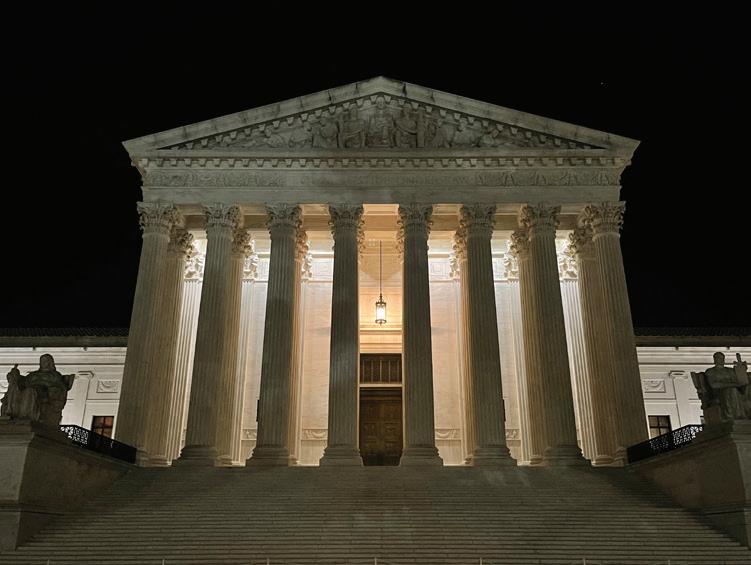
On college campuses, we learn most from those whose experiences and stories differ from our own. A homogenous student body limits thought and prohibits growth. Tulane must imple- ment new admission methods and outreach programs to ensure the success and well-being of all students.
In the basement of the Lavin-Bernick Center for University Life, a group of students gathers every Wednesday evening. With consistency and excellence, fact-checkers, copy editors, section editors, layout editors and other dedicated team members ensure that a small, local college newspaper stays alive.
Whether or not you read it, see it or like it, we are here — The Hullabaloo.
The media landscape has undergone, and is still undergoing, dramatic changes. By 2016, Americans’ trust in mass media to report news “fully, accurately and fairly” plummeted to 32%. By 2022, little had changed; only 34% of Americans trusted mass media. Following increasing political polarization creating conflict in the media, a global pandemic caused journalists to lose their jobs and local newsrooms to close. Yet, local news remains a reputable and trustworthy source for community information.
Past editors-in-chief of The Hullabaloo worked tirelessly to keep a newspaper afloat amidst a pandemic that altered the media landscape. Within a college campus that, in some years, barely felt like a real college, we’ve been able to authentically highlight the stories of our community through quarantines, hurricanes, campus turmoil and protests. Our reporting remains strong, but we’re still fighting for visibility and engagement.
It’s these things I plan to tackle as The Hullabaloo’s 119th Editor-in-Chief.
I started college alone in August 2020, in a small dorm in Josephine Louise Residence Hall. It was here that I wrote my first article for The Hullabaloo. Finding it difficult to make connections, both within the Tulane University community and in a new city, I turned to writing. By the end of my fall semester, I seriously considered transferring. But the one root I planted during that time — in this newspaper — kept me here.
Before starting college, I had two goals: to explore the city of New Orleans to the best of my ability and to get involved with journalism. The Hullabaloo helped me do both. I never thought I’d make it this far, but I’ve had the privilege to work amongst a team of individuals who each year always encouraged me to keep moving forward. To be trusted to lead such a special organization is the honor of a lifetime.
Over the past three years, I’ve worked as a writer, section editor and managing editor. My jobs were content-focused,
but I’ve learned about every side of the organization along the way. Every team member across every function of the organization is crucial to maintaining our position as Tulane’s eyes and ears. Even more crucial is you — readers, students, faculty, staff and alumni.
Our community keeps us alive, but we’re not just limited to Tulane. Tulane is part of a greater beast — New Orleans. I’m no New Orleans native, but this city is the first I’ve ever wanted to call home. To do our job effectively, we must think about our positionality. To tell the stories of both Tulane and New Orleans, we have to continue to think about whose voices may be obscured, who hasn’t yet had the chance to speak. In the upcoming year, I hope that everyone we serve trusts The Hullabaloo enough to know that your story can have a place with us.
Entering this year, the entire staff of The Hullabaloo is committed to promoting authentic, community-driven content that is increasingly accessible to everyone. With a more engaging social media strategy, greater outreach and a consistent brand across all platforms, we want you to know that we’re here to stay — we’re beginning better.
I’m beyond proud, grateful and honored to work alongside a group of talented and ambitious people who make our work possible. This year, our managing board is composed of the following: Managing Editor Martha Sanchez, Chief Copy Editor Alexia Narun, Production Manager Nathan Rich, Personnel Director Doxey Kamara, Digital Director Hannah Levitan and Chief Business Manager Matthew Scheulke. Our Fall 2023 General Board includes Ellie Cowen, Lindsay Ruhl, Aidan McCahill, Carly Barovick, Casey Wade, Ian Faul, Max Handler, Scott Houtkin, Benny Greenspan, Shivani Bondada, Taylor Fishman, Campbell Harris, Ruby Motz, Riley Hearon, Arushi Kher, Brooke Mason and Patrick Johnson.
Thank you to our faculty advisor, Tel Francois-Bailliet for your constant guidance, as well as to Jude Papillion and Lily Mae Lazarus for always believing in me.
I look forward to the amazing work we have in store, and I encourage anyone and everyone to get involved. Whether you want to work with us, write a “Letter to the Editor” or advertise in the publication, we welcome you.
Learn more on our website, email us at hullstories@gmail.com or visit our office in G06 of the LBC.
As I sit down to pen my final “Letter from the Editor” for The Hullabaloo, I am drawn back to the first time I visited our newsroom in the Garden Level of the Lavin-Bernick Center for University Life. My experience over the past four years has been nothing short of transformative — filled with challenges and triumphs that have shaped me both as a professional and as an individual. As my tenure as editor-in-chief comes to a close, I am overcome with gratitude for this extraordinary organization and the exceptional team that has become my second family.
My journey began in the fall of my freshman year when I joined The Hullabaloo as a sports writer. I was instantly enamored by the dynamic work environment and the enthusiasm of our devoted staff. That same semester, I was honored to take on the role of sports editor, a position I held for three remarkable years before I was elected editor-in-chief. While I originally joined The Hullabaloo to create content that I am passionate about, it has since become, without a doubt, the most important part of my college experience.
In the fall of 2019, The Hullabaloo’s sports section was, by all means, a modest affair. Since then, myself and my co-sports editors, Mark Keplinger and Jeremy Rosen — along with our dedicated sports team — relentlessly worked to rejuvenate this section from the ground up. Despite facing setbacks along the way such as the COVID-19 pandemic in 2020 and the impact of Hurricane Ida in 2021, our perseverance led us to notable achievements. We expanded our coverage to include not only Tulane University athletic events, but local events such as New
Letter from the Editor
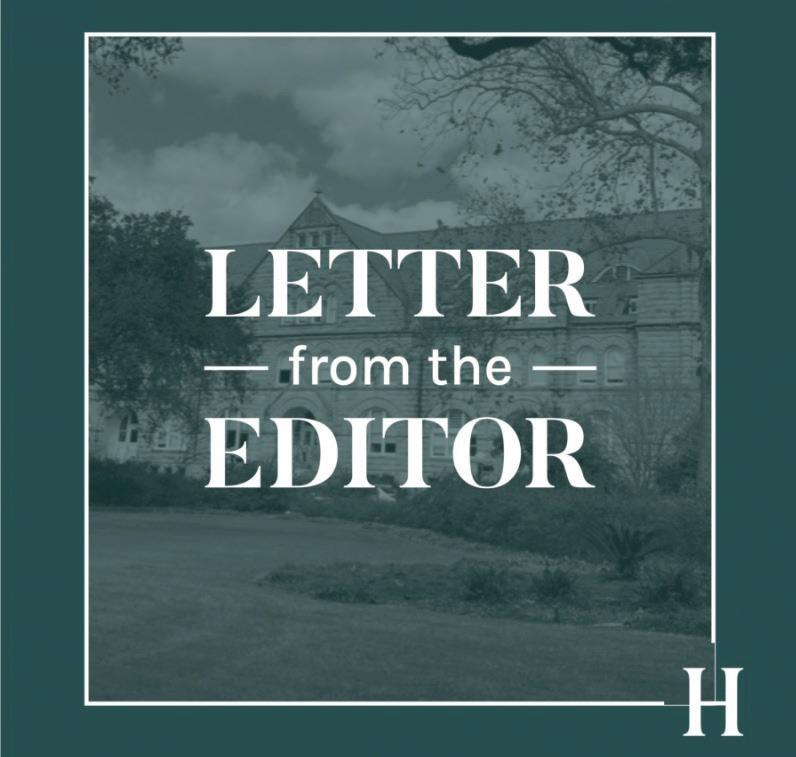
SIGNING OFF
JUDE PAPILLION EDITOR-IN-CHIEF EMERITUSOrleans Saints games, the Sugar Bowl, the NCAA Men’s Final Four and even high school sporting events. One of my greatest joys in this role was providing aspiring sports journalists the chance to cover high-profile events.
The pinnacle of our journey was undoubtedly covering Tulane football’s historic Cotton Bowl win over the University of Southern California Trojans in January 2023 — an event that our entire sports team traveled to cover. This moment, coupled with opportunities like covering the media events for Super Bowl LVII in February, are beyond what I ever imagined possible when I first set foot in our office in 2019. These are not merely career highlights; they are indelible memories that attest to the value of hard work, collaboration and never giving up.
Our achievements extend far beyond the sports desk. In October, The Hullabaloo was honored with a Newspaper Pacemaker — the Pulitzer Prize of College Journalism — by the Associated Collegiate Press for the eighth time. We were also recognized as a Pacemaker 100 recipient by the ACP, which honors the top 100 publications in the Pacemaker award’s history ranging from collegiate newspapers, magazines, online publications, yearbooks and broadcasts.
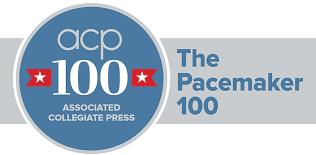
Just over a month later, our newsroom caught on fire, but we continued to write.
Martha Sanchez and Hannah Levitan masterfully spearheaded our news section, delivering reporting on key issues such as the latest developments within the growing fentanyl crisis on college campuses and the university’s sexual assault climate survey. Our Views editors — Phoebe Hurwitz, Rachel Kelly and Casey Wade — nurtured a vibrant platform where diverse perspectives on campus climate could be articulated and debated, while Doxey Kamara led Intersections, elevating marginalized voices and facilitating crucial dialogues to enrich our university community.
In Arcade, Sophie Borislow and Laura Malagrino kept students informed and engaged with happenings both on campus and in the broader New Orleans area. Finally, our team of fact-checkers
and copy editors served as our backbone, playing an essential role in maintaining the quality of our work and ensuring that we maintained strong journalistic integrity throughout everything we did.
My biggest accomplishment this year was retaining each and every member of our staff — Nothing that we did this year would be possible without every writer, editor, photographer, layout editor, copy editor, fact-checker and everybody else on our team. We truly had a great time working together and learning from one another to serve as the eyes and ears of the Tulane community.
I extend a heartfelt thanks to my managing board: Production Manager Will Embree for his aesthetic ingenuity; Chief Copy Editor Lenny Draper for her meticulousness; Personnel Director Holly Haney for her unwavering support; Digital Director Billie Wyler for her digital innovation; and Senior Business Manager Luke Wilson, the architect of our successful fundraising initiatives, including “The Next Edition” project that culminated in the creation of The Hullabaloo Endowed Fund.
I also extend my deepest gratitude to my managing editor and incoming editor-in-chief, Gabi Liebeler. Gabi’s tireless commitment to consistently elevate our work has not gone unnoticed and I am confident that she and her team — composed entirely of journalists who joined post-pandemic — will carry The Hullabaloo to new heights.
Finally, I would like to thank everybody else who helped me along the way. To my readers, family, friends, mentors, colleagues — your encouragement has been instrumental, making this journey not only rewarding, but also profoundly enriching. Thank you for the experiences and invaluable lessons that have shaped my time at The Hullabaloo.
-Jude PapillionHMANAGING BOARD
Gabi Liebeler EDITOR-IN-CHIEF
Martha Sanchez MANAGING EDITOR
Alexia Narun CHIEF COPY EDITOR
Nathan Rich PRODUCTION MANAGER
Doxey Kamara
DIRECTOR
Hannah Levitan DIGITAL DIRECTOR
Matthew Schuelke
Ellie Cowen
Lindsay Ruhl NEWS EDITORS
Aidan McCahill
Carly Barovick
Casey Wade VIEWS EDITORS
Ian Faul
Max Handler
Scott Houtkin
Benny Greenspan SPORTS EDITORS
Shivani Bondada
Taylor Fishman
Campbell Harris
Ruby Motz
Nathan Rich LAYOUT EDITORS
Riley Hearon
Arushi Kher
Brooke Mason COPY EDITORS
Patrick Johnson DISTRIBUTUION MANAGER
hullabaloo SporTS
Tulane Football is back: Here’s everything to know
SCOTT HOUTKIN SPORTS EDITORNine months later, there is still only one word to describe the madness that occurred on the football field for the Tulane University Green Wave: remarkable. A team lacking five-star athletes coming out of high school and certainly not the hotspot for elite transfers, the Green Wave achieved one of the greatest turnarounds in college football history. After two wins and ten losses in the 2021-22 season, the Green Wave flipped the script with 12 wins and two losses in the 2022-23 season. The program garnered national recognition, a feat that seemed impossible a year ago.
Tulane forced the world to turn their heads and acknowledge the team’s greatness. The team entered the Associated Press College Football Top 25 rankings for the first time since 1998 and went on to win the American Athletic Conference Championship over the University of Central Florida. The team also achieved a come-frombehind victory over the University of Southern California in the final seconds to take home the Goodyear Cotton Bowl Classic.
Excellence on the field also resulted in NFL teams taking notice. Tulane’s star running back and 2022 AAC Offensive Player of the Year, Tyjae Spears, received plenty of NFL attention during and after the season. His versatility and athleticism impressed the Tennessee Titans, who drafted him in the third round at the 2023 NFL Draft in April.
Dorian Williams and Nick Anderson, two AAC All-American linebackers and the leaders on defense for
Tulane last season, both joined NFL rosters as well. Williams was drafted by the Buffalo Bills, just 10 picks after Spears. Anderson received a contract as an undrafted free agent from the New Orleans Saints.
With so many familiar faces gone, many might assume that Tulane’s success on the field will not continue. However, reigning AAC Coach of the Year, Willie Fritz, is returning as head coach for another season after turning down other coaching opportunities. In addition, 2022 All-Conference Second Team quarterback Michael Pratt and All-Conference First Team center Sincere Haynesworth both decided to return for another season, turning down
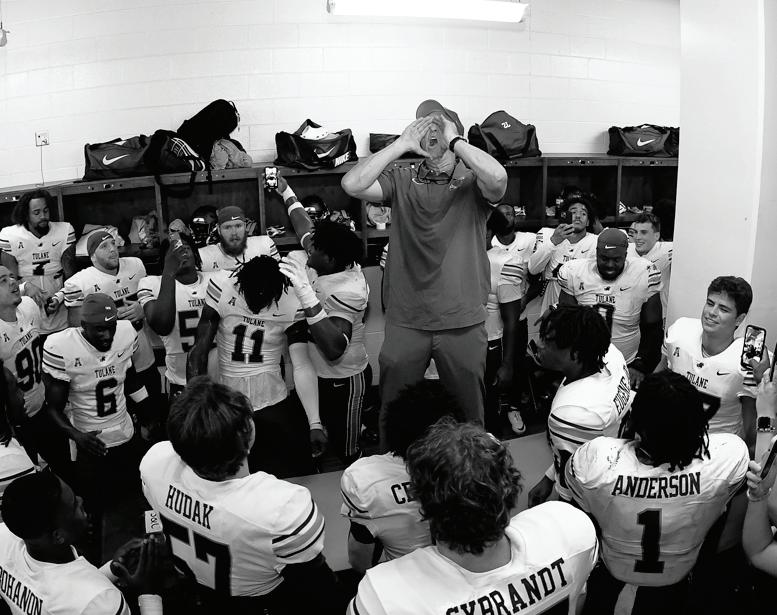
the transfer portal and NFL Draft. With Fritz, Pratt and Haynesworth all back in the fold, the team returns three key pieces to propel them towards another season of success.
Fritz was not shy about reloading his roster with more talent. With the departure of star running back Spears, Fritz quickly found his potential replacement in lightning-fast running back Shedro Louis who transferred to Tulane from Liberty University. Louis is on the smaller side at just 5-foot8 and 170 pounds, but his speed and ability to make defenders miss will immediately be noticed on the field. He finished his senior season at Liberty University with 529 yards on 122
SCHEDULE BREAKDOWN
What’s in store for Tulane Football this fall
BENNY GREENSPAN SPORTS EDITOR9/9/23
9/16/23
carries. Louis will be teaming up with returning redshirt sophomore running backs Shaadie Clayton-Johnson and Iverson Celestine to try and recreate Spears’ success out of the backfield this season.
Key pass-catchers Shae Wyatt, Deuce Watts and Tyrick James are going to be missed this season, as they finished their last seasons being three of Pratt’s top five receivers. However, Tulane has plenty of depth to work with, as wide receivers Jha’Quan Jackson and Lawrence Keys III are returning and Phat Watts, twin brother of Deuce Watts, is healthy again following an ACL injury that cut his season short in 2022. Jackson and Keys were large contributors for Tulane in 2022, as they both posted at least 30 catches and combined for 850 yards. They will need to step into even bigger roles this season if Tulane wants to continue its success.
Tulane also has a new starting tight end in Alex Bauman, who only tallied eight catches as a freshman. However, he has already become a household name to Tulane fans everywhere for his legendary game-winning touchdown catch with just nine seconds remaining against USC in the Cotton Bowl. His grab is likely the most iconic moment in Tulane athletics history, but Bauman is still writing his story. As a sophomore this season, Bauman will be asked to make lots more big-time plays.
The offensive line is also expected to remain among the elite groups across the country. Led by Haynesworth, Tulane has two other Reese’s Senior Bowl
CONTINUED ON PAGE 16
9/2/23
Ole Miss (Home)
University of Southern Mississippi (Away)
9/23/23
Nichols State University (Home)
The Green Wave’s first out of conference opponent is the South Alabama Jaguars from the Sun Belt Conference. This will be no cake-walk, as South Alabama is coming off a 10-3 2022 campaign, coming just short of reaching the Sun Belt Conference Championship game.
University of South Alabama (Home) Arguably the most important game for the Green Wave this season comes in week two, when they face off against SEC opponent Ole Miss. Ole Miss enters the season ranked 22nd, just two spots ahead of Tulane. A win against a storied program such as Ole Miss would be key for Tulane if they hope to reach a New Year’s Six Bowl Game for the second straight season.
Tulane travels to face off against their main rival, Southern Miss, in week three. Known as the “Battle for the Bell,” Tulane and Southern Miss have been going at it since 1893. This gives the Green Wave a chance to bounce back from their worst loss of the 2022 season, when Southern Miss beat them 27-24.
Tulane returns home for their final out of conference game against the Nicholls Colonels. Nicholls went 3-8 last season, giving the Green Wave a good chance to close out its out of conference play on a good note.

9/30/23
University of Alabama, Birmingham (Home)
Tulane opens its conference play against a new member of the American conference, the UAB Blazers. UAB finished in the middle of the pack in the Conference USA a year ago with a 7-6 record, and are one of six teams that joined the American Athletic Conference from CUSA.
11/4/23
East Carolina University (Away)
Following their matchup against the Owls, the Green Wave will travel East to face the Pirates, who have had two consecutive bowl eligible seasons. Last season, Tulane managed to beat ECU 24-9. With ECU losing both their starting quarterback and running back to the draft, the Green Wave hopes for a similar outcome.

10/13/23
University of Memphis (Away)
Coming off of its bye week, Tulane travels to Memphis, Tennessee for a critical in conference matchup, as Memphis is viewed to be one of the biggest threats to top the Green Wave in the AAC. This game will take place on a Friday night and will be televised on ESPN.
11/11/23
University of Tulsa (Home)
On Nov. 11, the Green Wave will face the Tulsa Golden Hurricanes, who they defeated 27-13 the previous season. With a lot of roster turnover and the hiring of Ohio State’s Offensive Coordinator Kevin Wilson as their new head coach, the Green Wave will be forced to protect home field against a completely different Tulsa team.
10/21/23
University of North Texas (Home)
Following its trip to Memphis, Tulane comes back home for its homecoming weekend game against the North Texas Mean Green. North Texas went through many changes in the offseason, as not only did they join the American, but they underwent a quarterback and coaching change. This sets up the Green
10/28/23
Rice University (Away)
The Green Wave will travel to Houston to face off against another new American opponent, the Rice Owls. The Owls are coming off a 5-8 season in the CUSA conference, and are led by quarterback JT Daniels, who is entering his sixth season playing for his fourth team.
11/24/23
University of Texas, San Antonio (Home)
11/18/23
Florida Atlantic University (Away)
Tulane will go back on the road to face the Florida Atlantic Owls, who are entering their first year in the AAC. The hiring of new head coach Tom Herman, who previously coached the University of Texas Longhorns from 2016 to 2020, has brought hope to an FAU program that is coming off a 5-7 2022 campaign.
The Green Wave will travel to Houston to face off against another new American opponent, the Rice Owls. The Owls are coming off a 5-8 season in the CUSA conference, and are led by quarterback JT Daniels, who is entering his sixth season playing for his fourth team.
Inside Tulane Football: Player, coach perspectives
AIDAN MCCAHILL ASSOCIATE NEWS EDITOREditor’s note: Aidan McCahill entered retirement after three years playing for Tulane Football.


Last week, New Orleans experienced record high heat, with temperatures reaching 102 degrees on Wednesday. While many college football teams across the country have indoor practice facilities, Tulane does not enjoy that luxury.
“It’s been a battle,” said center and team captain Sincere Haynesworth, yet he seemed to relish the adversity. “Honestly that’s how I would want these practices.”
Certainly not a typical response, yet Tulane football is not a typical program. It’s one that has faced unusual adversity for years.
Haynesworth, who has been on the team since 2019, remembers when “Tulane” and “football school” were not synonymous. “I had a lot of people when I committed to Tulane ask me, ‘why would you go there?’” he said.
Tulane’s historic turnaround, going from 2-10 and Hurricane Ida to 12-2 and a Cotton bowl victory is now common knowledge among Tulane students, yet many don’t know the program was almost canceled — once in the 1980s and again after Hurricane Katrina.
Now it seems those days are behind the Green Wave. Following last year’s Cotton Bowl victory, the Tulane Athletics fund
grew by 40% and expanded donor support, according to athletic director Troy Dannen. Some of that has gone into a new sports medicine facility and locker room for the team, but Dannen said that money is being invested in all sports programs as well.
What was the catalyst that sparked the 360 turnaround? Certainly not the talent — the only major loss was defensive lineman Jeffrey Johnson to Oklahoma. Both Quarterback Michael Pratt and Haynesworth agree the reason was changing the perception of what Tulane football could be, which ultimately started with guys stepping up and leading.
I spent three years on the team, and can att role seriously. The energy from everyone in practice went from ‘how can I find a way to get through these 3 hours’ to ‘our leadership is giving their all to be great, what can I do today to help fulfill that?’
One issue Tulane has faced is coaching turnover, with many coordinators seeing it as a launchpad to a bigger-name program. Pratt has now been coached by a different offensive coordinator in each of his four seasons at Tulane, while the defense has had three in that same timespan.
“You learn a lot of different perspectives…so your knowledge of football and your IQ goes up a lot,” Pratt said. “But it is very tough going season to season, not really being able to work on the little details and perfecting your game.”
Lucky for Pratt, he’s had a ton of experience with this year’s offensive coordinator, Slade Nagle, who’s been in the program
since 2016. “That’s kind of the biggest thing going into this year is not having to learn all that new stuff for the most part, and really being able to dial in.”
Head Coach Willie Fritz has been the one source of stability despite flirting with Georgia Tech last year. When asked about what he looks for in hiring new coaches, the answer is simple: “I try to find good guys…guys that I think are going to be good role models and mentors to our student athletes.”
One of those guys, hired after Tulane’s 2-10 season from Louisiana Tech, was strength and conditioning coach Kurt Hester. Arguably speaking, strength coaches reflect the heart and soul of the program, tasked with instilling work ethic in players early on, and spending long hours in the summer and after practice with the players. Hester remembers coming in trying to earn players respect rather than make changes right away. “Give me two weeks to earn your trust,” Hester remembers saying, after two weeks, players bought in.
According to Pratt, Hester is best at treading the fine line between strictness and fun. Cracking jokes while pushing players to their limit. Another aspect is being creative with workouts, trying to give players that edge on gameday no other team will have.
One of these workouts is “The Great Surge,” a 3-hour team building exercise in the middle of the summer, where players draft their own teams and compete in grueling activities including sled-pushing and kettle bell drags. Hester maintains the competition isn’t the point, but rather to
see how guys act psychologically. Another technique he’s employed this summer is conditioning with weighted vests and beanies, in order to mimic full pads and the heat trapped in a helmet.
Looking ahead, the question is whether or not a culture of winning will continue. “It’s something that takes a lot of care,” Haynesworth tells the younger guys. Pratt agrees, “You got to do things the right way. And that doesn’t just count for football. You got to go to your classes, you got to handle your business as a man, but really just be intentional with everything that you’re doing.”
Tulane has potential. Despite losing key veterans such as Dorian Williams, Nick Anderson and Tyjae Spears, expectations are still high. This week the team plays South Alabama before facing off against #22 ranked Mississippi. After practicing nearly all spring and summer, Defensive Back Jarius Monroe couldn’t have put it better, “I finally get to hit somebody else. Yeah, that’s exciting.”

The week two matchup may be more publicized, but Fritz doesn’t like to look ahead much. “The last 10 workouts, we’ve just locked in on South Alabama,” he said.
Walking through the upgraded locker room, players are constantly reminded of this with “1-0” posters on the walls, a mantra Fritz shouts throughout his day reminding players to focus on the nearest task at hand. Still, it’s a nice change to see a growing breed of Tulane fans looking ahead, glimpsing at forecasts of cooler weather and conference supremacy.
The Tulane hullabaloo

Football faces defensive shakeup heading into 2023 season
(CONTINUED FROM PAGE 14)
Watchlist nominee offensive linemen in Prince Pines and Cameron Wire. Last season, Pines was an outstanding offensive guard for the Green Wave. His massive frame at 6-foot-5 and 335 pounds, along with his impressive athleticism make him an intriguing player to watch. Wire spent five years with the LSU Tigers, playing guard and tackle, before transferring to Tulane this season. Another massive lineman at 6-foot-6 and 305 pounds, Wire hopes to use his experience at LSU to help solidify Tulane’s offensive line.
Tulane’s linebacking core will look a little bit different this season with two new starters in Jesus Machado and Corey Platt Jr. Machado has spent his first three seasons with Tulane, but his role grew last season as he recorded 40 tack-
les and one pass defended. Platt Jr. also spent last season with Tulane, where he recorded 25 tackles, one sack, one fumble recovery and one interception.
Tulane is returning almost all of their key defensive linemen from last season, led by Patrick Jenkins and Darius Hodges. Jenkins, a New Orleans native, had an impressive season last year, with 39 tackles and three sacks. Hodges also helped anchor the defensive line last season with 37 tackles and five sacks. Another defensive lineman to look out for this season is Adonis Friloux, who is returning from a torn ACL that occurred during practice right before the 2022 season began. Frilouz is expected to regain a starting spot on the defensive line this season and might be in for a breakout year.
The Green Wave lost secondary key contributors from last season but it
returned cornerback Jarius Monroe, who was awarded All-Conference First Team last season. Monroe is a senior who finished last season with 50 tackles, eight passes defended and three interceptions. He will lead a revamped secondary with high expectations this season. Opposite of Monroe is expected to be Lance Robinson. Robinson saw time on the field last season, recording 34 tackles and five passes defended.
Tulane also looks to replace their elite safety production from a year ago with Kam Pedescleaux and DJ Douglas. Pedescleaux transferred to Tulane this offseason from the University of Louisiana at Lafayette. Pedescleaux is undersized at 5-foot-9 inches, but he was productive this past season for the Louisiana Ragin’ Cajuns, as he recorded 72 tackles, six passes defended, two forced fumbles and one interception.
At the other safety position, Tulane hopes Douglas will make a big jump as a redshirt junior. Douglas was a small contributor for the team last season, as he finished with 21 tackles, one pass defended and one interception, but there is optimism he will thrive in a larger role this season.
Pratt should only improve as he enters his fourth season as Tulane’s starting quarterback. The defense will look different, and it will be difficult to replicate last season’s success with so many talented starters gone, but this team is no stranger when it comes to turning unheralded players into stars. There will be some hiccups along the way with so many new pieces, but after seeing what Fritz has done so far at Tulane, it should come as no surprise if the Green Wave keep riding high this season.
